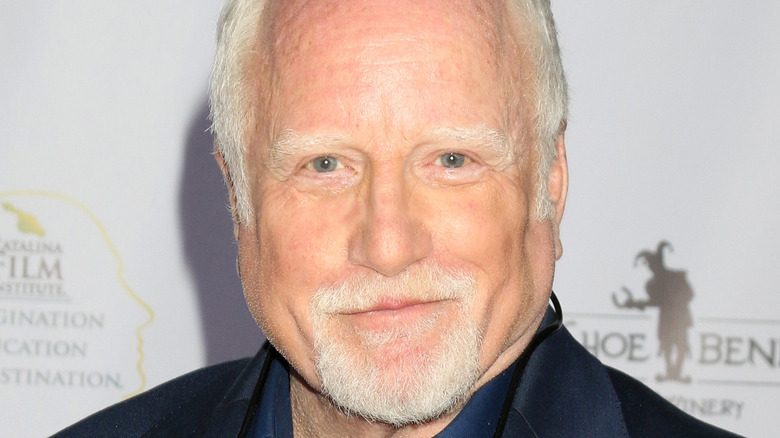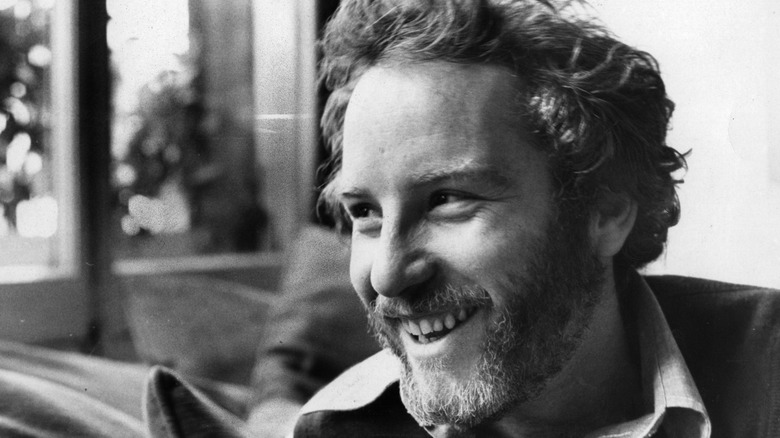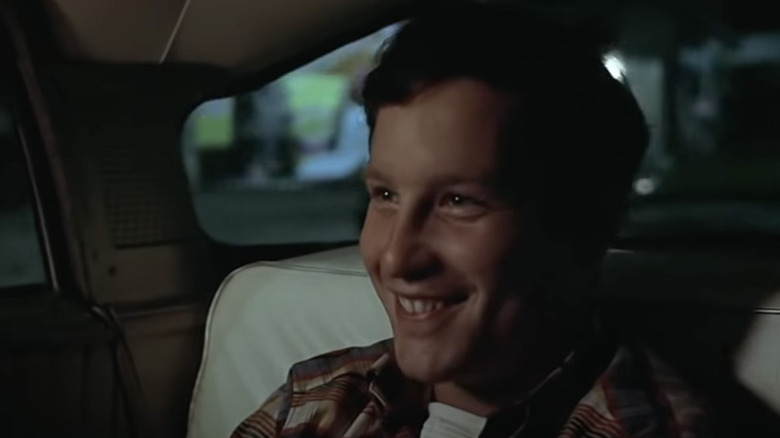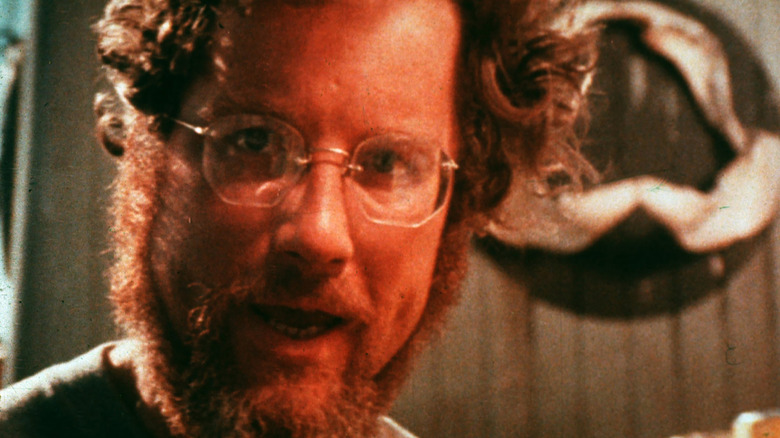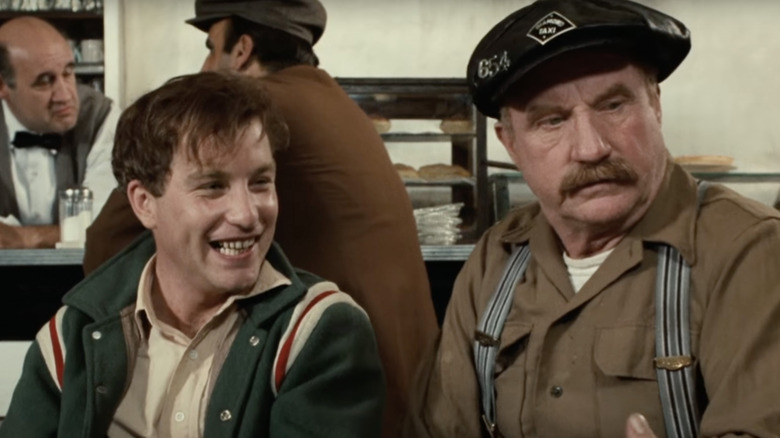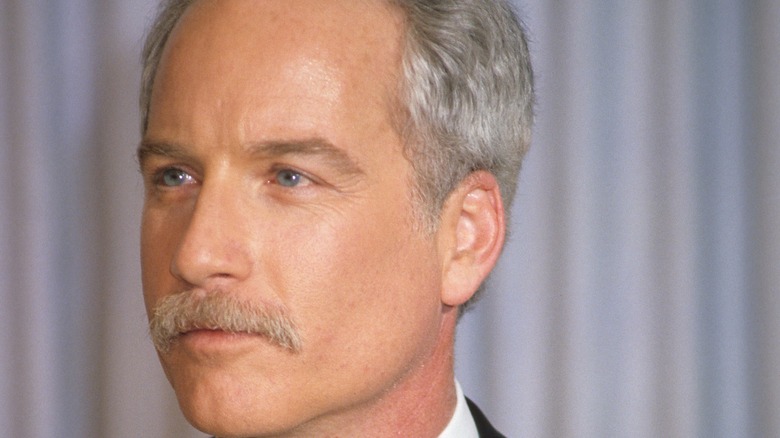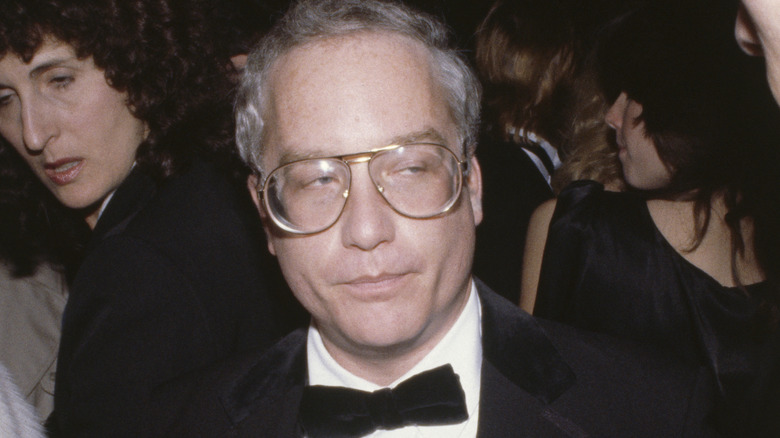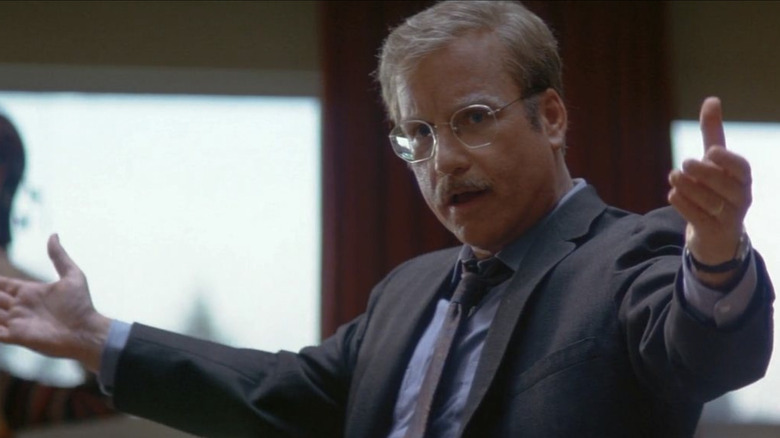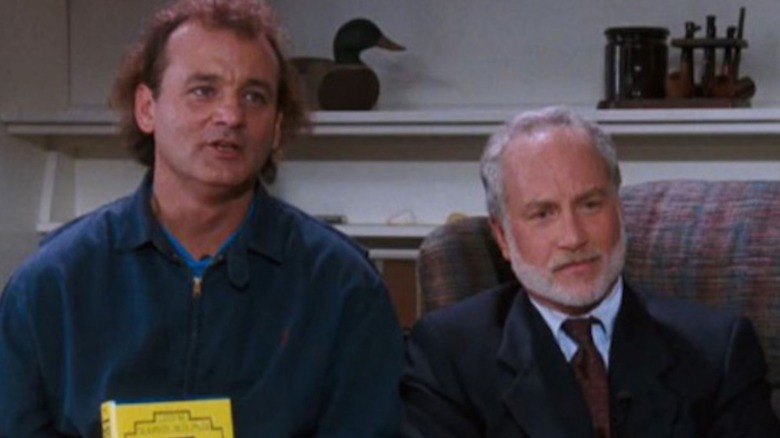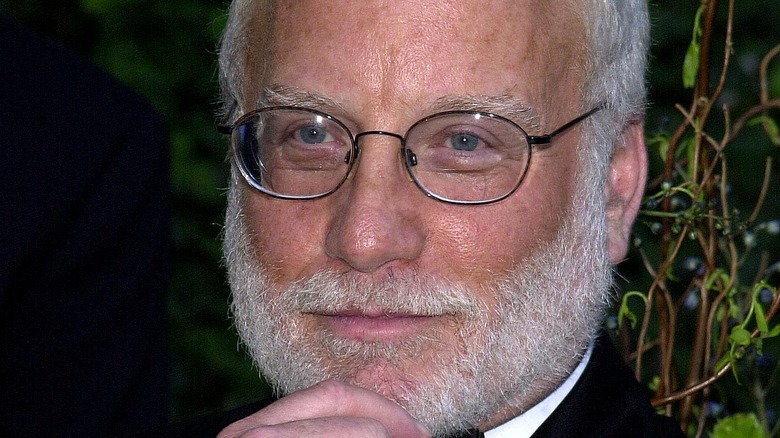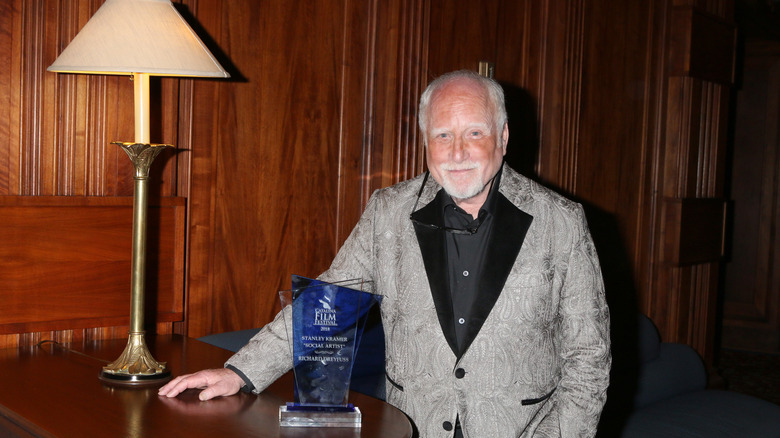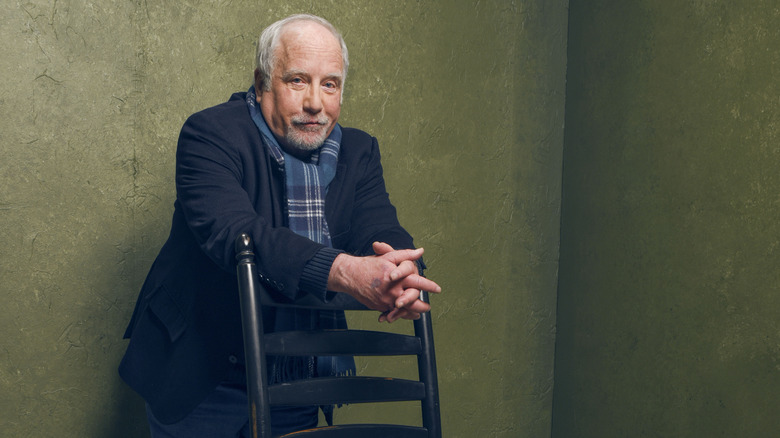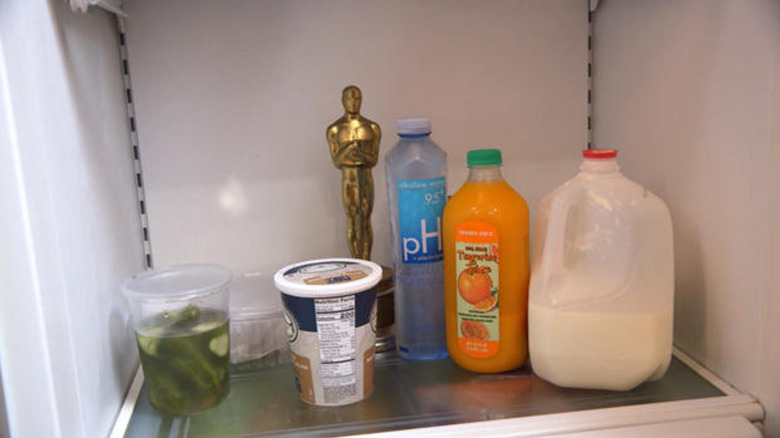The Untold Truth Of Richard Dreyfuss
Ever since he played the stubborn marine biologist in "Jaws," actor Richard Dreyfuss has loomed large in Hollywood one way or another. From "Close Encounters of the Third Kind," to "Mr. Holland's Opus," the actor has not only established himself as an exceptional actor but has also earned a reputation for being outspoken, tenacious, determined, funny, passionate, and perhaps a bit difficult.
Dreyfuss has never been one to hold things back, having been open about his difficulties with addiction and mental illness. But he also hasn't held back when it comes to his ambitions. ”I wanted to be the greatest actor in the world,” Dreyfuss told The New York Times. ”I still do. I don't think I will be, but I want to be one of the best. I would at least like to be the best actor Richard Dreyfuss can possibly be." Whether or not he has become the best actor he can be, he's had a full and fascinating life. Here are some facts about the actor you may not know.
He's been acting since age nine
Richard Dreyfuss did not come from a Hollywood family or even an artistic one, but he never considered a career other than the one he had. "I never wanted to do anything but act, and I always knew I'd be a star, ever since I was nine," he told The New York Times. "You know the 20th Century-Fox logo, the one with the big cement-block letters? Well, in my mind it was always 'Richard Dreyfuss the Star,' in those same cement letters."
When he told his mother that he'd like to be an actor, she told him, "Don't just talk about it," Dreyfuss recalled (via Esquire). So he took action immediately. "I got up from the table and walked to the West Side Jewish Community Center on Olympic Boulevard and auditioned for a play that day, and I have not stopped. Never." Nowadays, Dreyfuss believes he's achieved all of his acting dreams, telling The Talks, "I have made a number of whoppers, of errors, of mistakes, but I can't blame them off on anyone else, they are mine! So I think I, in a general way, fulfilled my dreams. And if I go tomorrow or 20 years from now, I can say that I did not ever change or make smaller ambitions ... Except for the fact that I think I would like to be taller... Other than that, I have achieved all my dreams."
He learned how to act from watching late-night movies
Other than an improv class, Richard Dreyfuss has no formal training in acting. Instead, he learned the craft "by watching movies as a kid," he told The New York Times. "That's where I learned acting. Really."
Rather than send him away from the television set, his parents supported him. "As a kid, I used to pride myself on being the only one in the neighborhood who liked his parents," he told the Times. His father was an attorney and his mother was a stay-at-home-parent, working to raise Dreyfuss and his two siblings. Dreyfuss used to set alarms to watch old movies on television late at night. Occasionally his mother would come out to find him in front of the television set. "She'd say, 'I'll get some cheese,' and we'd both sit there until 4:30 in the morning," he said.
After watching his idols, Dreyfuss would practice. He'd attempt to replicate his own emotional experiences. "I would have a fight with my brother and burst into tears," he told Esquire. "Then I would go to the bathroom and dry my eyes and try to burst into tears again and see how I did it. And then I would dry my tears and then try to burst into tears in still another way." The technique certainly seems to have worked for him.
He was a conscientious objector to the Vietnam War
Richard Dreyfuss, influenced by his parents, has always been politically minded, and that remained true when his draft came up for the Vietnam War. He declared his position as a conscientious objector and made his argument to the Westwood Draft Board, who assigned him to alternative services at Los Angeles County General Hospital (via NYT). While he didn't go to war, this was still a major sacrifice. Dreyfuss had been accepted to the prestigious London Academy of Music and Dramatic Art and had to give up his spot to complete his service (via The Guardian). He still regrets losing the opportunity for more formal dramatic training.
Still, Dreyfuss made the best of his time as he worked nights at the hospital. "I read, I wrote political essays, and I roamed through the hospital, talking to people around me," he told The New York Times. "I learned a lot of things — like the right way to moan, for example."
He turned down his Jaws role twice before accepting
Though he had previously appeared in "American Graffiti," Dreyfuss was not a movie star prior to his role in "Jaws." And, he very nearly turned down the role. When Dreyfuss initially met with Steven Spielberg to discuss the film, he had just gotten off production of the Canadian film "The Apprenticeship of Duddy Kravitz," and he was feeling extremely confident about his performance. With that in mind, he didn't feel he needed to take the role in "Jaws." Dreyfuss recalled the meeting with Spielberg in an interview on CBS, explaining, "[Spielberg] told me the story, and it was exciting. He said, 'You wanna do it?' And I went, 'No.' He said, 'Why?' And I said, 'Because I'd rather watch this movie than shoot it.' Because I'm an idiot! I mean, there's really no other explanation. I'm pretty stupid when it comes to certain things."
However, when "Duddy Kravitz" premiered, Dreyfuss quickly changed his mind. While the reviews of his performance in the film were glowing, Dreyfuss hated his performance. "I was terrified I'd never be hired again after 'Duddy Kravitz,'" he told The New York Times. "I saw every line reading that I did wrong, I saw every false energy level, saw everything I could have done better." He was worried his career was ending before it had really even started, and so he thought he should take the job he was offered. "I saw 'Duddy Kravitz,' I called Steven [Spielberg], and begged for the part," he told CBS.
He was once known for his temper
Richard Dreyfuss's opinionated nature has gotten him into trouble over the years. After playing the titular "Duddy Kravitz," the public seemed to conflate him with the obstinate, abrasive character. In fact, one article titled "Is Richard Dreyfuss really Duddy Kravitz?" proclaimed that he, in fact, was similar to the character (via The New York Times).
"Do I have a temper?" Dreyfuss once pondered to CBS. "I've fought for my right to say something ... And I think that's interpreted as a temper." Either way, Dreyfuss has certainly managed to get into trouble. During the production of "American Graffiti," Harrison Ford threw him into the swimming pool at their hotel. It was all playful, but Dreyfuss remembers that he got "pretty angry." He briefly attended San Fernando State College but was kicked out of the drama department when he got into a heated argument with a professor about the merits of Marlon Brando's performance in "Julius Caesar" (via the Times).
Dreyfuss learned to moderate himself more as he got older. ”Under certain circumstances, I am still a provocateur,” he said in 1981. ”I can create a very hostile atmosphere, just to get some action going. What I learned is that there are consequences to our actions, and I stopped needing to theatricalize those moments in life.” But, in many ways, his passion is simply part of his nature. "He's very vocal, very opinionated, very intellectual, and very committed. That can rub some people the wrong way," James Woods told the Times.
He is known for his confidence... and arrogance
Richard Dreyfuss has never been shy about his ambitions, nor that he is aware that he is a highly skilled actor. "Modesty is not my big thing," he once told The New York Times. "As a matter of fact, I despise modesty." At the start of his career, he was interested in celebrity because he thought that, in addition to deserving the attention, it would give him the power to do the highly ambitious projects he wanted to do: "I trust my instincts, have good taste, I know who the good actors are. I think I'm the smartest person in my life. I want to play Hamlet on stage. I want to play Judas."
However, behind that confidence was a lot of fear. When he won an Oscar for "The Goodbye Girl" at age 30, he was the youngest person to have won the award, and it scared him. "I was much happier with my potential stardom than when that stardom became a reality," he said in 1978. "I didn't anticipate the guilt and the fear of success. I didn't anticipate the downside of success at all," he elaborated in a conversation with Esquire. The roles that he was offered after his Oscar win scared him. "I had a lot of doubts when it came to certain roles and for instance, no one realizes it, but what I was most afraid of was playing an adult — because I wasn't an adult yet," he told The Talks.
He struggled with fame and turned to risky drug use and bad behavior
In 1978, an illustrated Richard Dreyfuss appeared on the cover of Esquire with the headline "Richard Dreyfuss: Out of Control." Stories of his temper, drug use, excessive drinking, and related car accidents had spread through Hollywood. He told CBS that in the 1970s he "proceeded to become a low-down, lying, dirty dog for a bunch of years."
Dreyfuss told Esquire that his tailspin began when a Broadway production of Julius Caesar, in which he was slated to star, was canceled. He comforted himself with alcohol and drugs. "I had enormous guilt feelings about how easily things had come to me, and I started to resist the position I was in by drinking a lot, doing drugs, eating too much, being childish, denigrating my talent, and generally doing a lot of things that were getting in my way," he told Esquire.
"My sense of him was that he was in despair," actress Carrie Fisher told Esquire in 1987. "I don't think he ever had a sense of how to relax. And I think drugs — even though you couldn't say they relax you — they just stop it for a second." Dreyfuss eventually stopped his self-destructive behavior, got sober, started therapy, and did the hard work of repairing his relationships. "I did some bad things,” he said (via The New York Times). ”I hurt people. I believe myself to be a good person, but I've done things I'm ashamed of, and I've learned from that.”
If you or anyone you know is struggling with addiction issues, help is available. Visit the Substance Abuse and Mental Health Services Administration website or contact SAMHSA's National Helpline at 1-800-662-HELP (4357).
Mr. Holland's Opus marked his comeback to Hollywood
Between 1978 and 1987, Dreyfuss largely took a step back from acting, only taking a few roles as he dealt with his personal issues, including a divorce and a nearly-fatal car accident. When he began working again in earnest, he was no longer fresh off his Oscar win and the success of "Jaws" and "Close Encounters of the Third Kind." It took a few years for him to once again play a role that really caught Hollywood's attention.
Then, in 1995, he became a Golden Globe nominee for his role in "Mr. Holland's Opus." Produced by Disney, the film was not an obvious shoo-in for rehabilitating Dreyfuss's public image as a serious actor. However, like Dreyfuss himself, the film's titular character struggled to balance career ambitions with showing up for his family and community, and his performance was lauded. "This movie will serve as a reminder of how brilliant he is," casting director Sharon Bialy told The New York Times prior to the film's release. "It will put him back on everybody's A-list." Many critics were happy to see Dreyfuss back in top form. "Dreyfuss is the kind of actor who has been getting better as he grows older, and here he acquits himself with a sensitive, honorable performance," wrote Emanuel Levy in Variety.
He has a feud with Bill Murray
Richard Dreyfuss starred alongside Bill Murray in the 1991 film "What About Bob?" and while the film is a cult classic, Dreyfuss' memories of the production are not comedic. One night, Murray came in for dinner and confronted Dreyfuss. "He put his face next to me, nose-to-nose," Dreyfuss told Yahoo! Entertainment. "And he screamed at the top of his lungs, 'Everyone hates you! You are tolerated!' There was no time to react because he leaned back and he took a modern glass-blown ashtray. He threw it at my face from [only a couple feet away]. And it weighed about three-quarters of a pound. And he missed me. He tried to hit me. I got up and left."
Many people in the film industry have reported similar experiences with Murray's erratic moods and tantrums. His friends gave him the nickname "the Murricane," and director Harold Ramis called him "irrationally mean" (via The Guardian).
However, Dreyfuss has stopped giving air to the story, telling CBS, "I told the story, and then after about eight or 10 years, I stopped. Because I wasn't gaining anything. And it wasn't making me feel good or adult." In 2017, he was even complimentary of Murray, though with a caveat: "Bill Murray is a pig. What really irritates me about him is that he's a good golfer and I'm not and also, he's funny enough that, even now, although I loathe him, he makes me laugh," he told The Telegraph.
He has bipolar disorder
While Richard Dreyfuss has always been open about his emotional struggles, he didn't share his official diagnosis until 2006, when he participated in the documentary "The Secret Life of the Manic Depressive" (via Today). And although he had sought out psychiatric care as early as the 1970s, he didn't know his diagnosis himself until the 1990s, when his divorce spurred on a particularly dark time. For his children's sake, he again sought out therapy. "Counseling helped kill my guilt," he told People. "We went on a journey to find the right meds and it took four long years ... I'm able to be Richard again. Things are great."
Dreyfuss has since made an effort to speak out about the illness. "Stigma is silly, stigma is stupid," he said in "The Secret Life of the Manic Depressive. "You wouldn't be you without whatever it is you've got. Just because my thing has a name doesn't mean anything. It just means that there's a group of people that have a name attached to their condition" (via Express).
If you or someone you know needs help with mental health, please contact the Crisis Text Line by texting HOME to 741741, call the National Alliance on Mental Illness helpline at 1-800-950-NAMI (6264), or visit the National Institute of Mental Health website.
Dreyfuss supports the #MeToo movement, despite an accusation against him
In 2017, as the #MeToo movement gained traction, Richard Dreyfuss' son Harry Dreyfuss wrote in Buzzfeed News that actor Kevin Spacey groped him when he was 18. Dreyfuss took to Twitter to support his son, writing "I love my son @harrydreyfuss more than I could explain with all the words in the world. And I am so incredibly proud of him right now."
However, less than a week later, Vulture published an interview with writer Jessica Teich, who accused Dreyfuss of exposing himself to her and of sexual harassment. "He created a very hostile work environment, where I felt sexualized, objectified, and unsafe," she said. Dreyfuss's response made it clear that he knew he had often been out of line in the past. "I am horrified and bewildered to discover that it wasn't consensual. I didn't get it," Dreyfuss said in a statement provided to Vulture.
Dreyfuss continues to deny Teich's allegation and has expressed fear about due process getting lost in the #MeToo movement. "I can understand, women have lost a great deal by men ... Women have been abused by men for millennia, but it's not something that's going to be solved by committing an equal or worse crime, which is kicking process into the ocean," he told The Guardian.
If you or anyone you know has been a victim of sexual assault, help is available. Visit the Rape, Abuse & Incest National Network website or contact RAINN's National Helpline at 1-800-656-HOPE (4673).
He loves politics and history
Dreyfuss has long been interested in history and politics. "We've been active in progressive democratic politics all of our lives," he said of his family in The New York Times. Dreyfuss himself belongs to the American Civil Liberties Union, was outspoken against Richard Nixon and Watergate, and once had to "flee Mobile, Alabama, where his life was threatened after he spoke out against the Ku Klux Klan," per Esquire. In 1974, still early in his career, he told The New York Times that he wanted to become a senator, saying "I have personal integrity and a moral outlook, and I enjoy, the exercise of power."
His interest in politics is very much tied to his love of history. "My hobby is history," he told The Talks, and Esquire reported that he listens to historical audiobooks while driving. He has even managed to take history into his Hollywood career, with his production company Dreyfuss/James Productions producing historical movies like "Quiz Show" and TNT's "Kissinger and Nixon" (via NYT). However, in an interview with CBS he said there's still a historical role he'd love to play: Ulysses S. Grant.
He keeps his Oscar in his refrigerator
Richard Dreyfuss won an Oscar for best actor for his performance in the 1978 film "The Goodbye Girl." At the time, he was the youngest-ever actor to win the award (via Express). He was thrilled to have the statuette. "On the night, Sylvester Stallone handed it to me and I didn't let go of it until I was on a private plane to Brooklyn, [where I was] appearing in 'Julius Caesar,'" he told CBS. "And I never let the thing outta my hand. So they didn't get it back to do the imprinting on it."
However, Dreyfuss now keeps his award in a slightly unusual, albeit cool, place: the refrigerator. "No. That's not a joke," he confirmed to CBS. "It's just that I want people to know that I won the Oscar. I just don't like to brag about it ... So I figure sooner or later the guys go, 'Got anything to drink in this house?" And apparently, his award display took some effort: "He's tall so I had to change the shelves around" (via Express).
